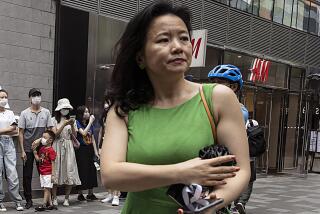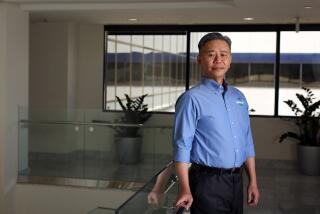Disgraced Cadre Wants His Good Name Back
- Share via
BEIJING — Zhou Wei has the rare distinction of having been excommunicated by the Communist Party twice.
The first time, he was a model cadre who became a target of Mao Tse-tung’s 1957 “anti-rightist campaign,” a ruthless crackdown on suspected counterrevolutionaries. Then only 26, Zhou suddenly found himself stripped of his party membership and banished to the countryside for more than two decades.
His lot changed in 1979, when victims of the campaign were rehabilitated under Deng Xiaoping. Welcomed back into the party fold, Zhou went on to an exemplary career as a cadre at a factory in northeastern China, where he worked hard to realize Deng’s dream of “socialism with Chinese characteristics.”
But chances for a happy ending evaporated four years ago. By then, the fiery Zhou had become a thorn in the side of local authorities for doing exactly what the central government says ought to be done: rooting out official sleaze.
Through protests, petitions and trips to Beijing, Zhou and other party stalwarts in the rust-belt city of Shenyang demanded better treatment for retirees, farmers and workers and helped unearth a massive scam that has so far resulted in the imprisonment of the mayor and the execution of his deputy.
For his zeal as an anti-corruption crusader, an idealist still committed to the principles of his youth, Zhou was kicked out of the party a second time, locked up in a labor camp and painted in the media as a self-aggrandizing, unscrupulous demagogue.
Now out of custody, Zhou, 71, wants his good name back -- and he’s gone to court to get it.
“A lie is a lie,” he said emphatically before hearings on his libel and defamation suit opened here this month. “Chinese law protects a person’s privacy and reputation, so we want to use the law as a weapon to fight back.”
His legal battle with five media outlets is the latest twist in a remarkable story that highlights how much things have turned upside down in the world’s last communist giant.
Once, veterans of the revolution like Zhou were hailed as the country’s saviors, and hard-working cadres were considered China’s lifeblood. Once, peasants and workers were the masters of an egalitarian utopia in the making.
But now, yesterday’s heroes are personae non gratae, and former “class enemies,” such as entrepreneurs, are the darlings of society as today’s Chinese ditch notions of equality in favor of oceans of wealth.
Few have enriched themselves as diligently, and as dishonestly, as the scads of local officials willing to use their positions to make a buck or two -- or much, much more -- through bribery, graft and fraud. Corruption scandals across China are legion.
Even so, the scams in Shenyang, a provincial capital and one of China’s largest cities, have raised eyebrows both for their scope and for an investigation that has so far netted scores of top officials, including a dozen municipal department heads.
The various illegal schemes included a land grab that dispossessed hundreds of peasant farmers and a local bank that collapsed, wiping out nearly $1 billion in depositors’ savings.
Zhou and others were outraged as they watched officials buy fancy cars, cavort with karaoke club hostesses and betray the ideals -- and downtrodden people -- the old-timers had fought for. Weaned on concepts of social justice and public morality, hundreds of Shenyang’s 20,000 retired Communist Party cadres began gathering once a week in a park to air their grievances and plan marches on City Hall.
At first, in 1995, their demands focused on their own concerns -- retirement benefits such as pensions and health care promised by the state but increasingly curtailed.
Soon, however, their modest successes inspired others to come looking for them -- and especially Zhou, who became the group’s ringleader. Sundays in the park with Zhou turned into political meetings where all sorts of complaints about official malfeasance surfaced -- and where these grizzled veterans of the revolution decided to take up causes besides their own, on behalf of others left behind by the changes sweeping society.
“This is a question of one’s outlook on life. We were trained under ‘Mao Tse-tung Thought.’ We may have been kids when we joined the revolution, but we did it to rescue the Chinese nation and to save the Chinese people from suffering more calamity,” said Zhou, who enlisted in the People’s Liberation Army as a 16-year-old in 1947.
“Our philosophy was: ‘First help others. Then help ourselves.’ Now, in this society, if we see people suffering, can we just stand by?”
The local authorities did not appreciate the irony in Zhou’s invocation of old communist ideals as a call to action against the new batch of cadres.
The police began bugging Zhou’s telephone and even followed him on his journeys to Beijing, where he frequently went to present petitions. After returning to Shenyang from one such trip in spring 1998, he was detained by the local public security bureau for 15 days. Later that year, the party he had joined half a century earlier booted him.
In spite of the harassment, Zhou and the other old stalwarts soldiered on.
Exasperated, the local government finally had Zhou arrested in May 1999 and threw him into a nearby labor camp, where he remained for two years.
“I was a political prisoner, but they put me together with common criminals,” he said.
While in custody, Inmate No. 297 refused to cooperate. Zhou would not admit to any wrongdoing. He continued to write protest letters, along with a report on the horrendous conditions in the camp, which had no bathing facilities and gave the prisoners deer feed to eat.
On the outside, his cronies agitated for Zhou’s release.
“We asked for permission for 1,000 old cadres to protest,” said Yuan Chongzhi, 71. “They refused. There’s a law allowing freedom of demonstration and association, but it’s a lie.”
Even as Zhou sat in prison, government inspectors were vindicating his cause. In October 1999, Shenyang Vice Mayor Ma Xiangdong was arrested on suspicion of corruption. His boss, Mayor Mu Suixin, was arrested in June 2001. Both men were subsequently convicted and ordered put to death. Mu’s execution was suspended, but Ma’s sentence was quickly carried out.
In all, more than 80 officials have been caught in the dragnet. According to Zhou, many more remain unpunished and in positions of power awarded to them by their disgraced superiors.
Zhou was released from the labor camp in April 2001, a few weeks before his sentence was up. But, feisty to the last, he refused to leave unless the authorities acknowledged that he had been wrongfully incarcerated.
They declined. Eight officers had to drag Zhou out.
“I was put in prison by the police,” he said, “and I was taken out of prison by the police.”
To add insult to injury, a Shenyang newspaper then published a scathing article about him on its Web site and encouraged other media to do the same. China’s top two Internet portals followed suit, as did one of Beijing’s most popular dailies, which accused Zhou of inciting unrest, making inflated claims about his role as a whistle-blower and even fathering a child out of wedlock when he was a young man.
Those outlets are among the five media organizations Zhou has sued for libel.
Zhou harbors no hope of recovering the research files and personal belongings that police took from him. He is also doubtful whether his retirement benefits will be honored, even though health care is all the more urgent for him now that he has stomach cancer.
But the man hailed by some Chinese newspapers as an “anti-corruption hero” is optimistic about having his reputation restored by Beijing’s courts, far from Shenyang.
And not only that: Zhou wants his membership in the Communist Party reinstated.
For all he’s been through, Zhou remains loyal to the organization that expelled him twice, that has embraced its former enemies and that has turned its back on many of those who helped bring it to power in the first place.
A few very rotten apples, Zhou says, don’t represent the orchard.
“I still believe in communism,” he said in an interview in the tiny Beijing dormitory room where he was staying.
There, his friends say, police from Shenyang would be less likely to find him.
More to Read
Sign up for Essential California
The most important California stories and recommendations in your inbox every morning.
You may occasionally receive promotional content from the Los Angeles Times.














